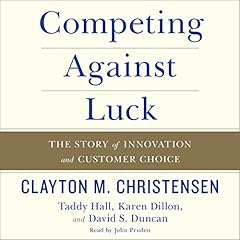
The Prosperity Paradox
How Innovation Can Lift Nations out of Poverty
Failed to add items
Add to Cart failed.
Add to Wish List failed.
Remove from wishlist failed.
Adding to library failed
Follow podcast failed
Unfollow podcast failed
3 months free
Buy for $24.29
No default payment method selected.
We are sorry. We are not allowed to sell this product with the selected payment method
-
Narrated by:
-
Mike Chamberlain
Clayton M. Christensen, the author of such business classics as The Innovator’s Dilemma and the New York Times best-seller How Will You Measure Your Life, and coauthors Efosa Ojomo and Karen Dillon reveal why so many investments in economic development fail to generate sustainable prosperity and offers a groundbreaking solution for true and lasting change.
Global poverty is one of the world’s most vexing problems. For decades, we’ve assumed smart, well-intentioned people will eventually be able to change the economic trajectory of poor countries. From education to healthcare, infrastructure to eradicating corruption, too many solutions rely on trial and error. Essentially, the plan is often to identify areas that need help, flood them with resources, and hope to see change over time.
But hope is not an effective strategy.
Clayton M. Christensen and his coauthors reveal a paradox at the heart of our approach to solving poverty. While noble, our current solutions are not producing consistent results, and in some cases, have exacerbated the problem. At least 20 countries that have received billions of dollars’ worth of aid are poorer now.
Applying the rigorous and theory-driven analysis he is known for, Christensen suggests a better way. The right kind of innovation not only builds companies - but also builds countries. The Prosperity Paradox identifies the limits of common economic development models, which tend to be top-down efforts, and offers a new framework for economic growth based on entrepreneurship and market-creating innovation. Christensen, Ojomo, and Dillon use successful examples from America’s own economic development, including Ford, Eastman Kodak, and Singer Sewing Machines, and shows how similar models have worked in other regions such as Japan, South Korea, Nigeria, Rwanda, India, Argentina, and Mexico.
The ideas in this audiobook will help companies desperate for real, long-term growth see actual, sustainable progress where they’ve failed before. But The Prosperity Paradox is more than a business audiobook; it is a call to action for anyone who wants a fresh take for making the world a better and more prosperous place.
Supplemental enhancement PDF accompanies the audiobook.
PLEASE NOTE: When you purchase this title, the accompanying PDF will be available in your Audible Library along with the audio.
©2019 Clayton M. Christensen, Efosa Ojomo, and Karen Dillon (P)2019 HarperCollins PublishersListeners also enjoyed...




















People who viewed this also viewed...


















should encourage innovation as a means to national growth rather than dependency on foriegn AIDS
An excellent perspective into development
Something went wrong. Please try again in a few minutes.
Good!
Something went wrong. Please try again in a few minutes.
Renewed Hope
Something went wrong. Please try again in a few minutes.
Thought provoking!
Something went wrong. Please try again in a few minutes.
I enjoyed this book more than I thought I will.
Something went wrong. Please try again in a few minutes.
I am certain to keep coming back to journey through certain pages for inspiration.
Compelling Thoughts
Something went wrong. Please try again in a few minutes.
Inspiring
Something went wrong. Please try again in a few minutes.
A must read!!
Something went wrong. Please try again in a few minutes.
Brilliant
Something went wrong. Please try again in a few minutes.
Full of hope in 2025!
Something went wrong. Please try again in a few minutes.



